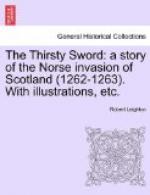At the time when Kenric was thus receiving his neighbours of Arran, the men whom Roderic had left in charge of the castle of Rothesay were making merry over their victories. A dozen of them, officers of the garrison, sat in the great hall — the hall in which the good Earl Hamish had met his death. On the bare board of the table there lay a cooked haunch of venison, with other viands that had been found in the buttery, with many cakes of brown bread and drinking horns filled with wine. For these men had not been long in command ere they had broached more than one wine cask with casks of other liquors of a stronger sort, and they grew ever more noisy and more boisterous, this one boasting of how many dogs of Bute he had slain, and that one vaunting that he had with his own hand struck the stripling lord of the island to the ground.
Often one of them would rise from the long bench before the fire and maul the venison with his bloodstained hands, turning it over this way and that; then taking his sword, which had been used that day for a very different purpose, he would cut off a great slice of the meat, and spreading a layer of salt upon it, clap it between two cakes of bread and sit down to enjoy the food. In eating, drinking, and singing wild battle songs, these warriors passed that evening, each thinking himself a king.
Some of the men were wounded, but little did they seem to care; nay, many a one even proudly displayed his bleeding cuts, to prove how sorely bestead he had been in the fight, and the man who had the greatest show of wounds was looked upon almost with envy. To be wounded was next to being slain, and to be slain on the field of battle was the most glorious death a man might die.
“Well, my brothers-in-arms,” at length said one who appeared to be their captain, “’tis a good day’s work that we have done. So let us drink and be merry. Here’s waes-hael to king Rudri of Bute. Long life to him!”
Then the men took up their drinking horns and drank deep to the last drop. But two there were who drank not at all, and they were men of Colonsay.
“Why drink ye not with me?” growled the captain, frowning.
“Because, Thorolf,” said one with flashing eye, “I am but ill-content with the way that Rudri broke his plighted word to us. When we set out on this journey, was it that we should but help him to gain his father’s island? No. Did he not solemnly swear that he would give us our full meed of vengeance upon the whelp who massacred our children? And what man of us has had that chance? Blood for blood, say I!”
“And so say I,” muttered his companion. “Methought when we came here that I should have the chance of driving my spear into a full half score of the children of Bute — that I might have served them even as the stripling Kenric served my little ones. Saint Olaf curse him!”
“It baffles me,” said the first, “to know by what means the women and children of this isle have been spirited away. Not since we landed yestermorn have I so much as seen a living child, nor woman neither, saving only that old witch.”




